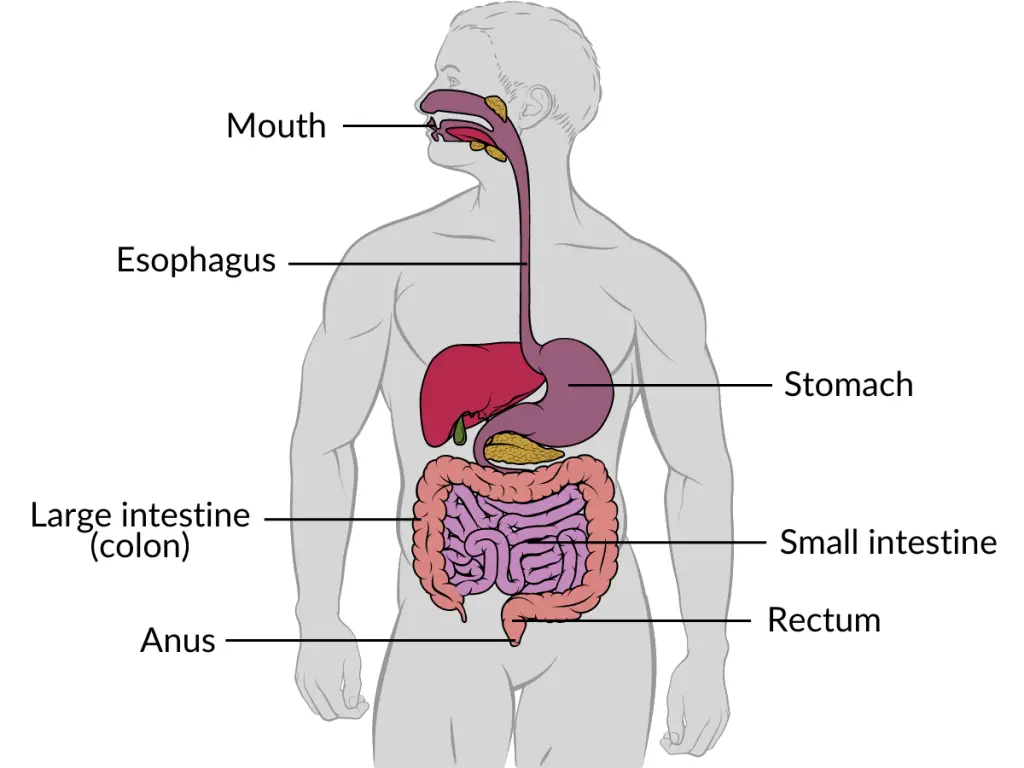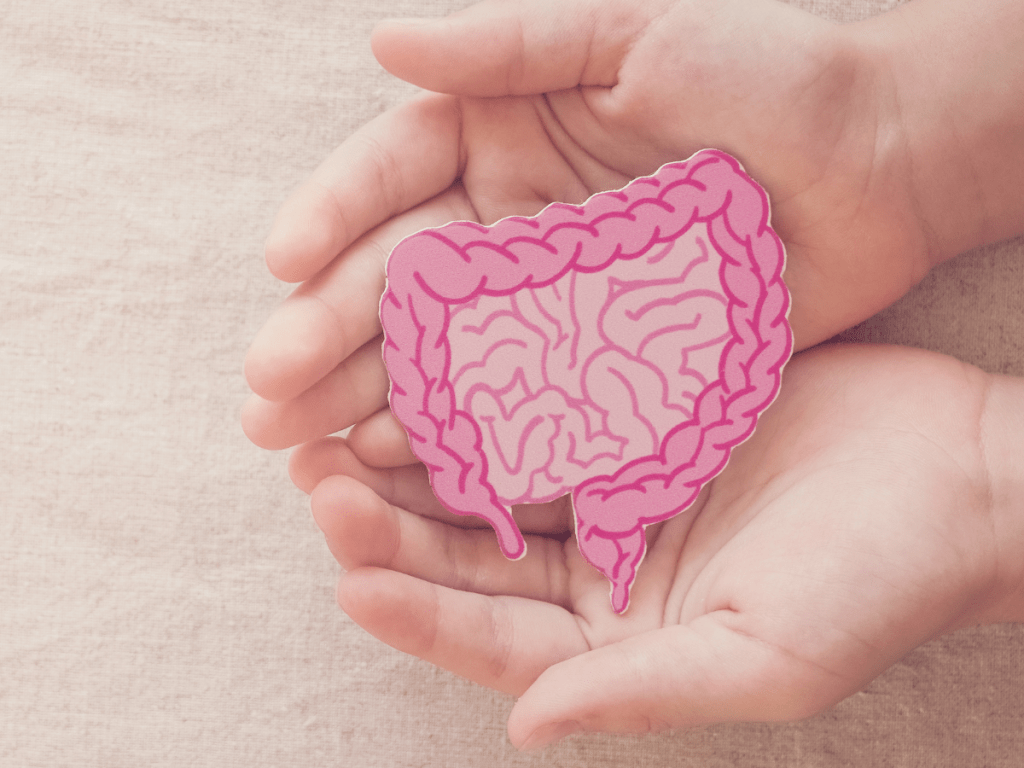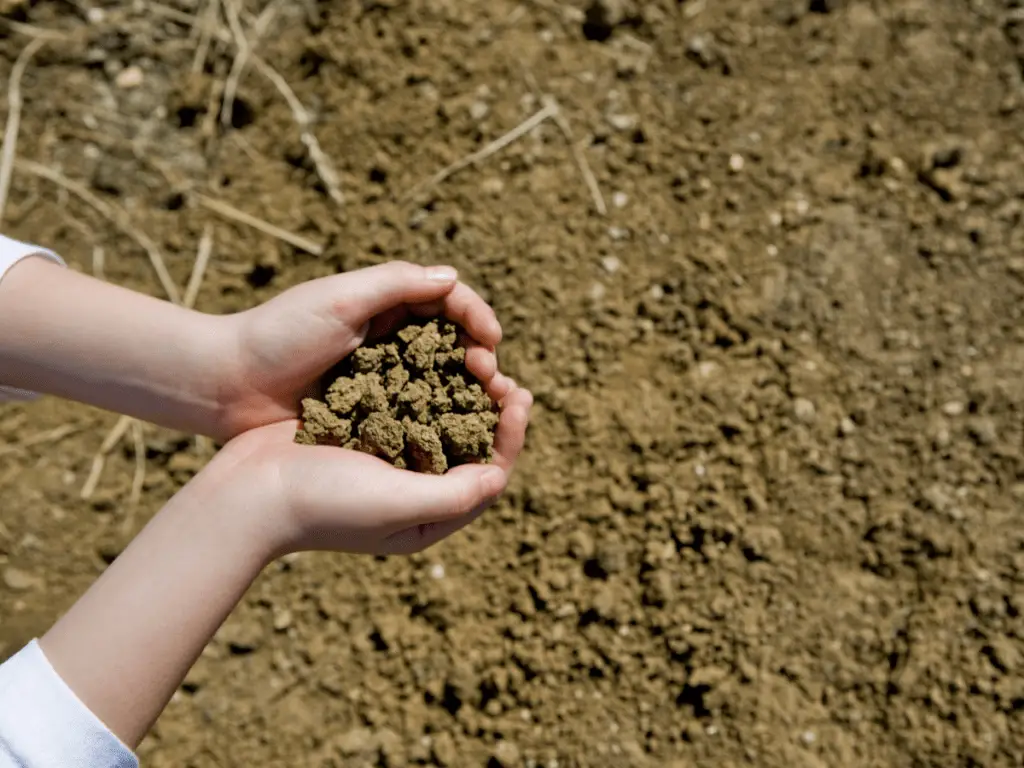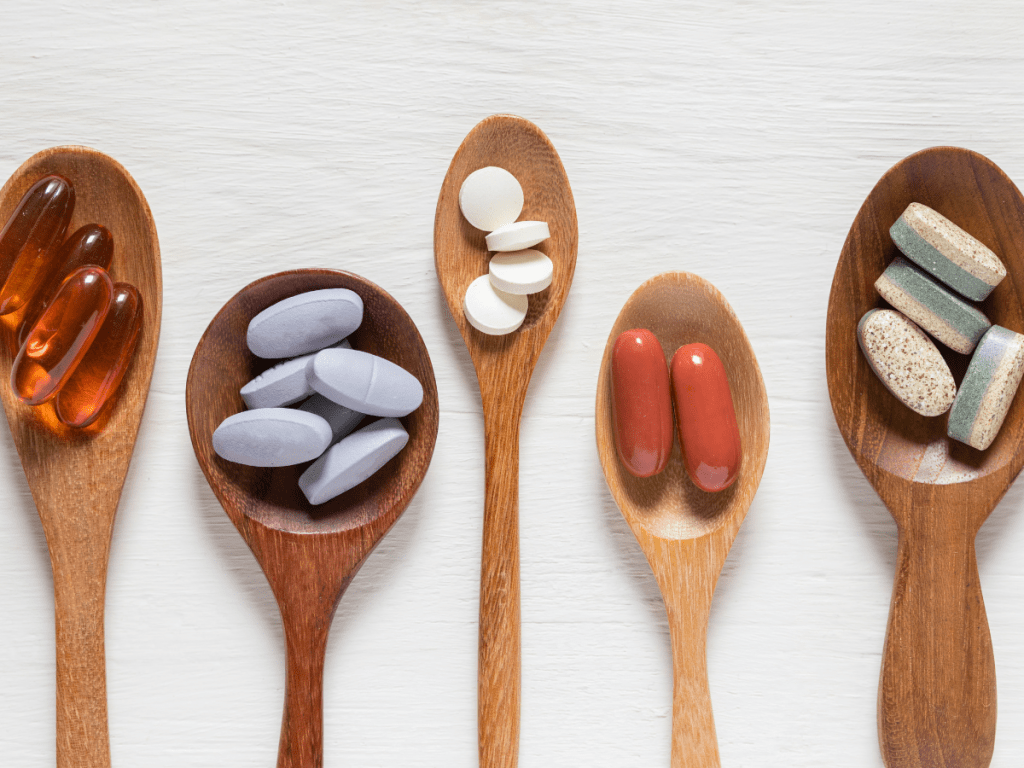Everybody is talking about gut health. But what is gut health and why is it so important? What are the signs you have poor gut health and how can you improve it naturally? Keep reading to find out all you need to know about gut health.

This post contains affiliate links, which means I make a small commission at no extra cost to you. See my full disclosure here.
What is gut health?
Gut health is the health of the entire digestive system and organs, such as the esophagus, stomach, and intestines, that work together to allow us to eat and digest food, absorb all its nutrients, and excrete the waste products.
Gut health also refers to the proper function and balance of the bacteria and microorganisms that live in many parts of the gastrointestinal tract. These microbes (trillions of them!!) do the important job of breaking down food to more digestible format, making vitamins, defending us against toxins and pathogens, as well as producing important molecules that are involved in our immune and nervous systems and in our overall health.
Finally, gut health implies the absence of gastrointestinal symptoms (bloating, abdominal pain, irregular bowel movements) disease (inflammatory bowel disease, cancer) and unfavourable local conditions (leaky gut or intestinal permeability, dysbiosis of gut bacteria).

How does your gut health affect your overall physical and mental health?
To understand why gut health can affect our overall physical and mantal health, let’s remind ourselves what our gut does.
First, our gut digests and deliver nutrients to the bloodstream so that they can be distributed throughout our body. Macro- (proteins, fats, carbohydrates) an micro-nutrients (vitamins, minerals) are what give us energy and make our body function.
Out gut is also a barrier against infectious bacteria, viruses, fungi, and harmful toxins. Over 70% of our immune cells reside in our gut and the gut plays a vital role in our immune system!
Our gut communicates with our brain through nerves and hormones (the so-called “gut-brain axis”), regulating many body functions, and largely affecting brain function and mental health.
What does this mean?
It means that an unhealthy gut cannot properly digest foods and supply us with the nutrients our body needs.
It means that an unhealthy gut cannot protect us from harmful infections and toxins.
It means that an unhealthy gut cannot help the brain maintain proper functions.
Gut health is fundamental for your overall optimal health and well-being. So let’s dive in and see what are the signs your gut is not that healthy and how you can improve your gut health naturally.

What are the signs you have poor gut health?
Poor gut health is (unfortunately) quite common nowadays. 70 millions of Americans are affected by digestive disease (source). Yes, you’re not alone. But this is not a good reason to not do anything to improve your gut health!
The signs of poor gut health include:
- Symptoms of poor digestion such as bloating, abdominal discomfort, loose stools, constipation, heartburn, nausea and vomiting: these symtoms are pretty common and everyone experiences them at some point. When these symptoms are recurrent or persistent, though, they can indicate underlying gut issues such as Irritable Bowel Syndrome (IBS) and stomach issues
- Unregular bowel movements or changes in bowel movements: this includes the form and frequency of bowel movements. A normal, healthy gut produces 1 to 3 bowel movements a day. Bowel movements should never cause pain or excessive strain, and the stool should be formed, smooth, long, log- or sausage-shaped, brown in color, and not have an excessively foul smell
- More serious symptoms: pain, rectal bleeding, blood in the stool, anemia, abnormal weight loss that can derive from stomach ulcers, severe and persistent vomiting, and jaundice. These symptoms can indicate Inflammatory Bowel Disease (IBD) such as Chron’s and Ulcerative Colitis, colon cancer, liver failure, or other conditions that require medical attention

But poor gut health doesn’t only show with gastrointestinal symptoms. As we’ve seen already, gut health influences our entire body and mind. Other symptoms of poor gut health include:
- Fatigue, brain fog, and difficulties sleeping
- Food cravings and/or food intolerances
- Unintentional weight gain or loss
- Skin issues
- Joint pain and frequent migraines
- Autoimmune conditions
- Mood disorders, anxiety and depression
How can you improve gut health naturally?
If you recognize any of the symptoms listed above, your gut health likely needs improvement. You can improve your gut health naturally, by changing your diet and lifestyle (read more about this here).
So let’s dive in and see how to improve gut health!
1. Diet for gut health
It’s pretty intuitive that the first step to improving the health of your gastrointestinal system is changing your diet.

- Stay away from processed foods and additives that are linked to increased inflammation and poor gut health. Source good, natural, whole foods and cook from scratch instead!
- Stay away from vegetable oils and hydrogenated fats that lead to inflammation. Consume healthy fats instead, such as grass-fed butter, lard, avocado, olive and coconut oil
- Stay away from excess starch: resistant starches found in legumes, potato starch, green bananas, whole grains and some vegetables are resistant to digestion. This means that they stay in your intestine and ferment, causing digestive problems and bacterial imbalances. Check out the benefits of a grain-free diet here
- Stay away from excess sugar: sugar can increase inflammation, while also feeding some intestinal bad bacteria and other microorganisms (especially yeasts such as Candida albicans) that cause dysbioses, leaky gut (intestinal permeability), poor nutrient absorption and other issues
- Eat more collagen and gelatin: the intestinal membranes and linings are mostly made of collagen, so eating plenty of collagen can help maintain and repair a healthy gut lining. Eat collagen-rich foods such as bone broth or homemade gelatin everyday, or take collagen supplements
- Eat more probiotic foods (such as yogurt and fermented vegetables) and expose yourself to natural probiotics such as soil-based probiotics found in soil and dirt. In some cases (such as after a course of antibiotics), a good probiotic supplement is also recommended, even though the choice of probiotic strains might vary depending on the circumstances
- Drink filtered or well water free from chlorine, fluoride, heavy metals, farmauceticals and other contaminants commonly found in tap water that can harm your gut and its microbiome
- Limit caffeine, alcohol, and avoid artificial sweetneers and other substances that can irritate the gut
There are also diets out there that are specifically formulated to improve gut health, such as the GAPS diet or the Specific Carbohydrate Diet (SCD).

2. Lifestyle and habits for gut health
A healthy lifestyle and habitats also benefit your gut health (read more about it here). Try starting with small changes such as:
- Increase your level of physical activity: staying active helps regulate your bowel, improve digestion, and reduce the risk of intestinal permeability and inflammation. Find 10 (fun) ways to exercise more without working out here
- Get proper sleep: sleep is essential for our health, including our gut’s
- Spend more time outdoors: being outside has so many health benefits (read all about it here), and in addition can expose us to beneficial microorganisms that can enrich our gut flora and strenghten our immune system
- Decrease stress: stress is one of the main causes of gastrointestinal symptoms and poor gut health
- Avoid unnecessary drugs and medications especially antibiotics (one of the main causes or dysbiosis and poor gut health), NSAIDS (can disrupt intestinal integrity and cause gastritis and intestinal bleeding), birth control (can increase risk of developing leaky gut and lead to yeast overgrowth), and acid reducers (stomach acids are needed to digest food, and acid reducers can lead to severe gut dysbiosis), and reduce your exposure to toxins

3. Natural remedies for your gut
There are also some natural remedies that can help improve your gut health and get rid of unplesant symptoms. I recommend:
- Activated charcoal: charcoal can help detoxify the body from toxins because it absorbs them and prevent their absorption. It can be useful to reduce bloating and cramping related to poor digestion, and might help treat diarrhea
- Serum Derived Immunoglobulin: is a protective nutrient which supports gastrointenstinal digestive and absorptive properties. It binds and neutralizes microbial components, and helps to maintain a beneficial gut microbiota, manage gut barrier function, and maintain immune balance.
- Colostrum: can help restore a leaky gut lining and reduce absorption of toxins and gut microbes into the bloodstream, as well as strenghten the immune system
- Zinc Carnosine: can help restore a leaky gut permeability, decrease inflammation, and treat gastric and duodenal ulcers
How to improve your children’s gut health
Taking care of our children’s gut health means setting them up for a lifetime of good health.
You can start improving their gut health before they are even born by taking care of your own gut health while pregnant. Good bacteria are passed from mom to newborn during vaginal birth when the baby goes through the birth canal, and later through breastfeeding and skin-to-skin contact. Offering a healthy, nutritious diet (see above and here) to your baby and growing child is also important once solids are introduced.

Related posts
5 Steps to Optimal Health: How to Improve your Well-being Naturally
Collagen and Gelatin: Health Benefits and how to Eat More
The Benefits of a Grain-free Diet and What to Eat
How to Reduce your Exposure to Toxins for a Healthier Life
10 (Fun) Ways to Exercise More Without Working Out
Spending Time Outdoors: All the Health Benefits
Organ Meats: List, Health Benefits, and How to Eat More
How To Make Homemade Bulgarian Yogurt in The Instant Pot
Instant Pot Bone Broth: Traditional Recipe Made Easier
Pear and Ginger Natural Gelatin
Shop this post
Probiotics
Pure Therapro Rx Saccharomyces Boulardii
Collagen and Gelatin supplements:
Natural remedies:
Extreme Immunity Igg Plus Serum Derived Bovine Immunoglobulin
Pin it for later

Hope this helps you! I’d love to hear in the comments down below what are your ways of improving your gut health!

wow, what a great post. full of so much helpful info. thank you so much1
Thank you! 🙂
Such great tips! I’ve been trying to change my diet for healthier gut choices, so this is encouraging.
Thank you very much! Glad you found it encouraging 🙂
Such good information. I’ve been on my own health journey for this exact reason. Thanks for all the valuable wisdom!
My husband suffers of IBD, so this is a topic very close to my heart. I hope this information helps you in your journey, thank you for reading! 🙂
Very helpful! Thanks so much for posting!
Thank you!
Thanks for the great info! Nice to have it all in one place!
Thank you!